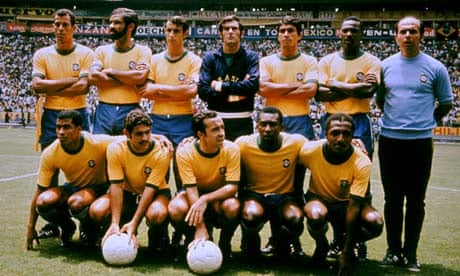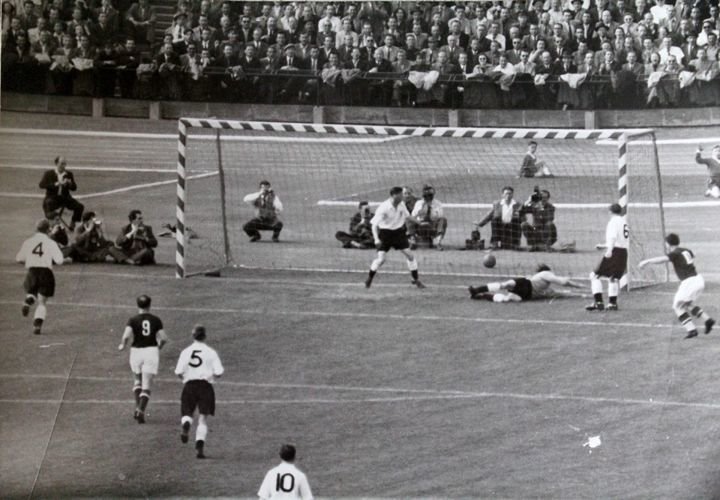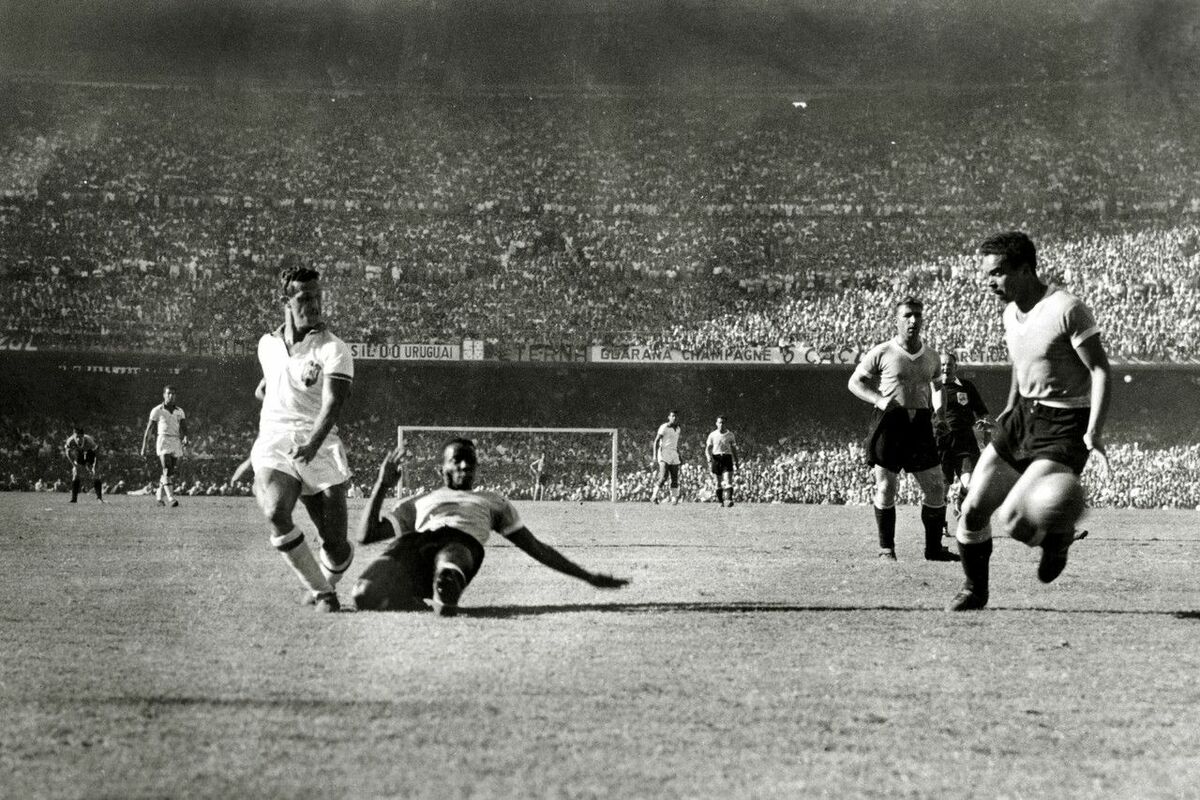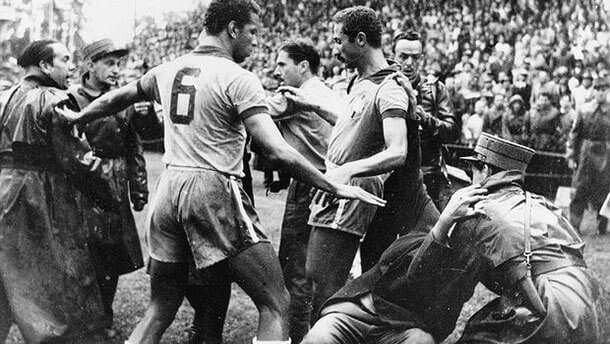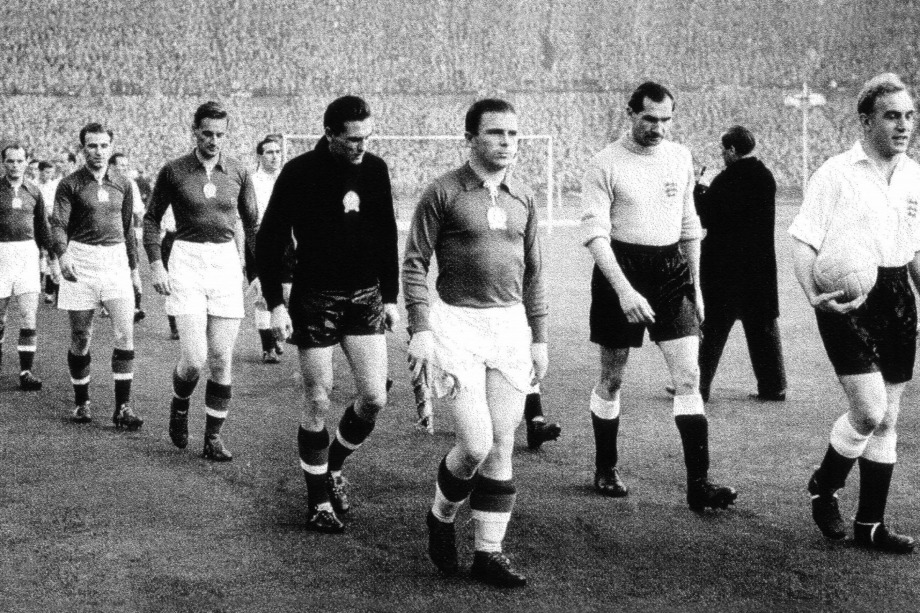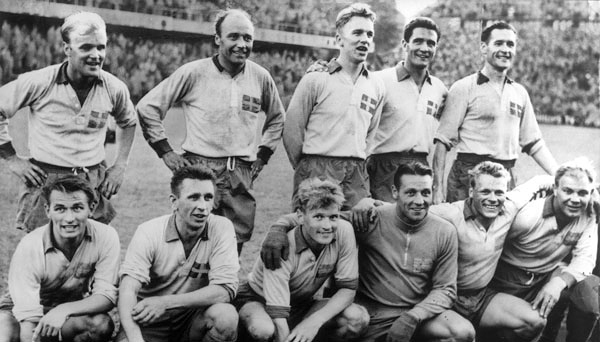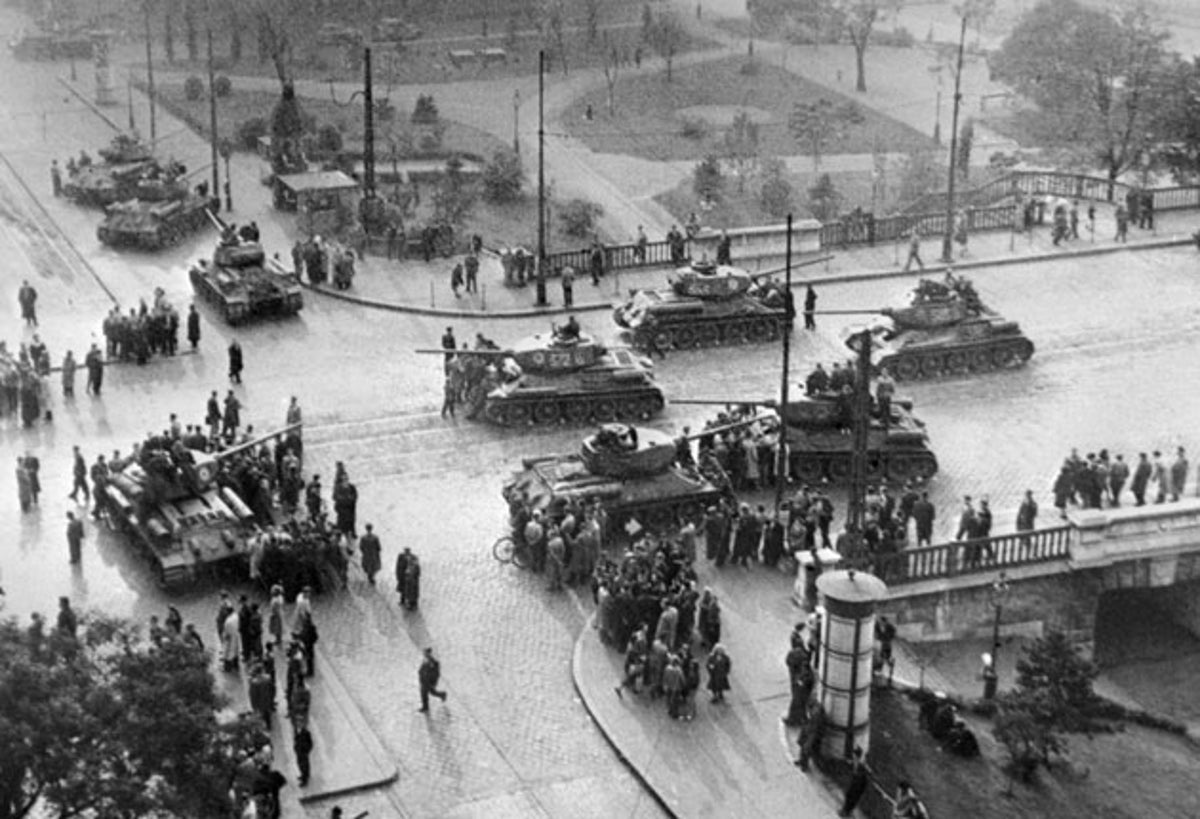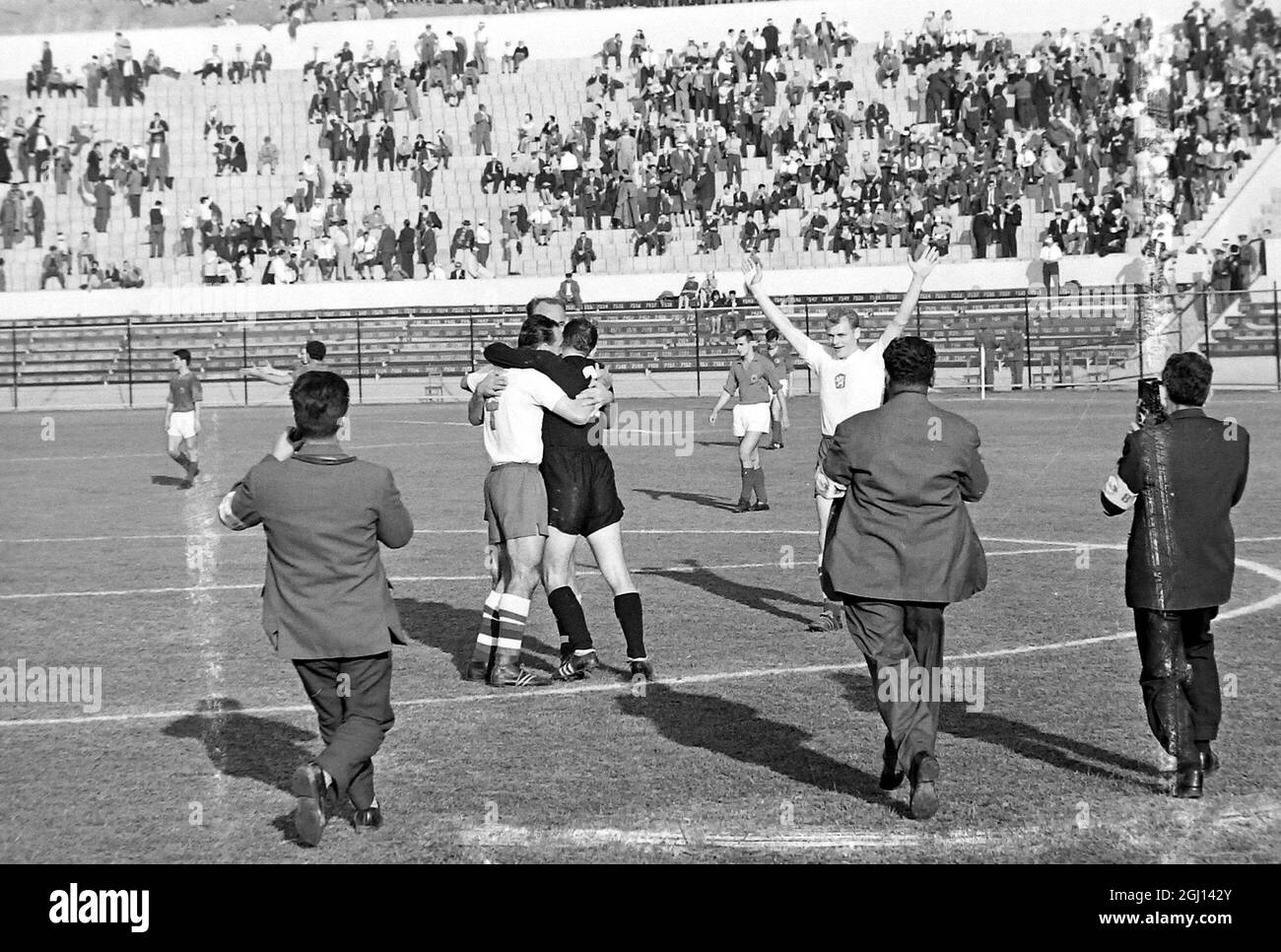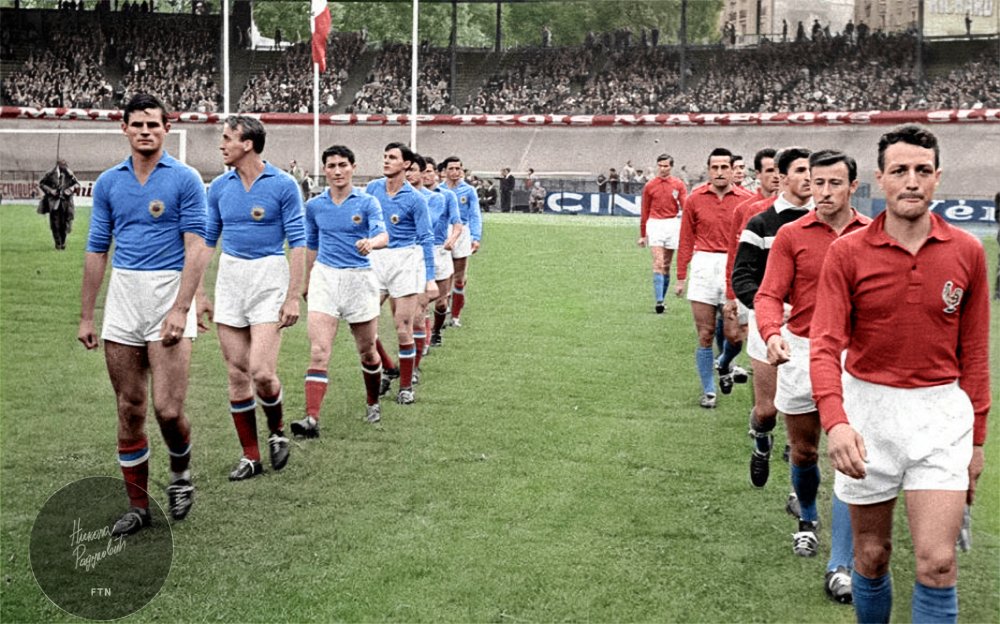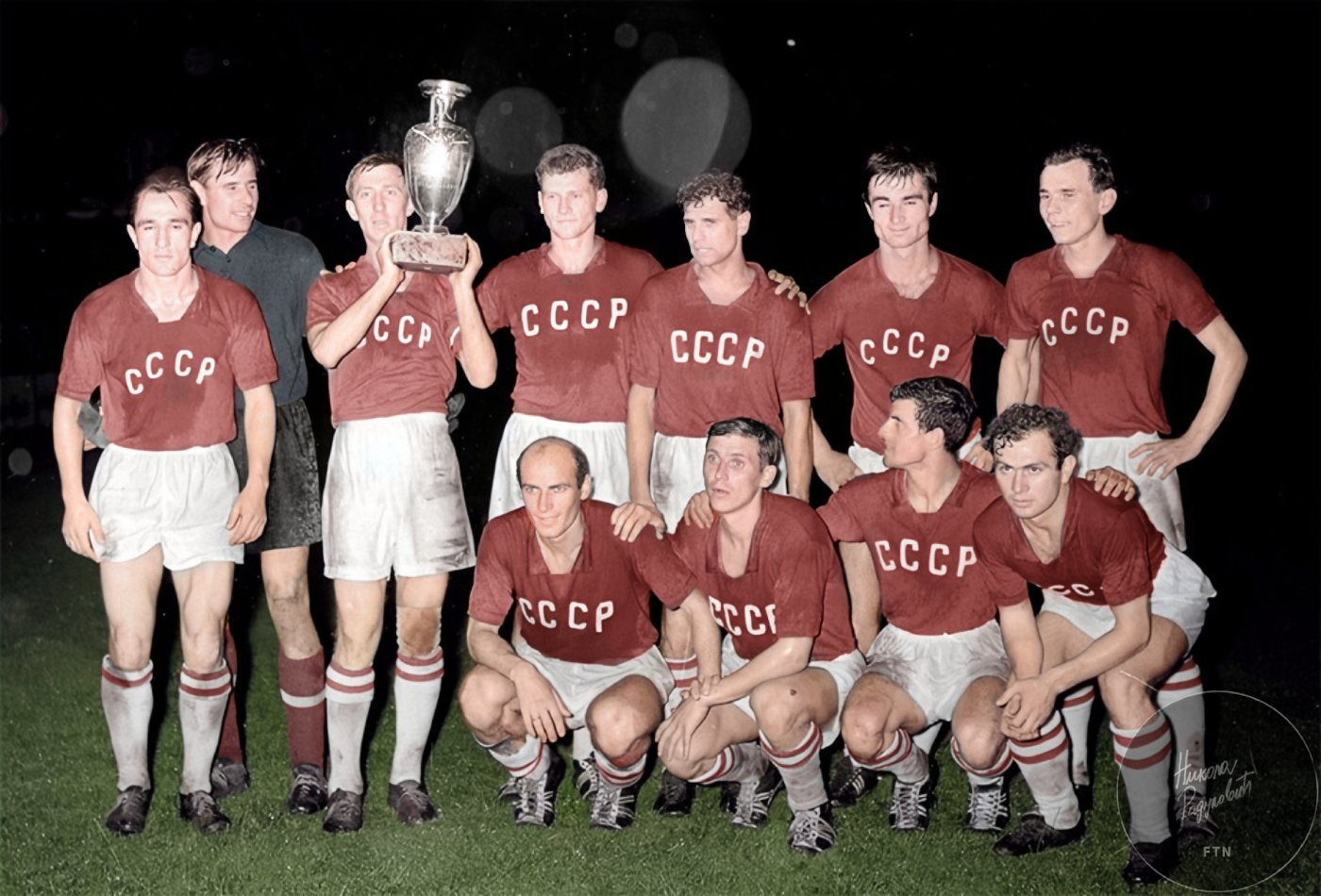1954 World Cup
"The agony of Maracana"
Quarter-finals
In the first ever such occurence in the history of the World Cup, Scotland was meeting its "Auld enemy", England. Both put on a splendid show for the 20 thousand spectators, with Tommy Ring and Dennis Wilshaw being the stars of the show. Both teams had chances throughout the first half, with England staying ahead of Scotland as the whistle was being blown, and Wilshaw also putting the Three Lions in the lead by the first minute. By the second half, Ring brought down the gap to 3-1, and Scotland began to believe in a comeback, but Wilshaw silenced the Tartans with a fine brace that put England two goals ahead of their neighbours. In the end, the match was only a prelude for what would happen throughout the knockout phase.
Dennis Wilshaw jumping for his 1st minute goal
A regional derby was then followed by another one. This time, it was the two forces of Eastern Europe meeting for a rematch of the 1952 Olympics. Hungary was probably even stronger than it was back then, while Yugoslavia was built up on its domestic champions of the past few years. It was going to be Gyula Grosics vs Vladimir Beara; Bernard Vukas vs Nandor Hidegkuti and Stjepan Bobek vs Sandor Kocsis. Both were formidable teams, and the crowd over at Belo Horizonte were given a splendid match as Hungary and Yugoslavia exchanged goals. For a moment, it looked like the Blues had the upper hand courtesy to the absence of Ferenc Puskas, but the Mighty Magyars managed to even the odds, and with some unfocused defending from Yugoslavia, managed to win the highly contested match. Once again, Yugoslavia crashed out of the quarter-finals, for the second time in a row.
Vladimir Beara being outsmarted by Hidegkuti
Uruguay was arguably going to have its first proper test in the tournament since their encounter with Austria in the preliminary stages, with the Italian squad still featuring the Grande Torino generation, even if its players were by now playing their final minutes of football. Nonetheless, Italy gave Uruguay's players a run for their money, as the stubborn Uruguayan attack was countered with a stern Italian defence. Even then, Juan Hohberg finally found an opening past Valerio Bacigalupo, ensuring that the greatest achievement of this generation of Italy would only be a quarter-final in this and the previous World Cup. Mannaggia, Italia.
Uruguay's team before their match of attrition against Italy
The hosts were on paper given the easiest possible opponent for the quarters, but Germany did not come to this World Cup just to be embarrassed. Despite A Canarinha eventually winning the match thanks to Djalma Santos and Julinho's genius, Germany put up a brave fight against the Brazilians with an attacking style of play. Fritz Walter and Max Morlock both came close to equalising during the 90 minutes that were being played, but only Helmut Rahn managed to score for the Mannschaft, although by the end, many thought that Germany could've scored more than just a consolation goal.
The hosts before their match with Germany
Semi-finals
Only two years after their historic match at Hampden, England and Hungary met once again, now on an even bigger scale, for what was surely going to be another match of the century. Much like in the previous encounter, Walter Winterbottom set up his English side in a "WM" formation, with England being expected to return the glory back to London after their embarrassment in Glasgow back in 1952. However, the Magyars managed to go one step beyond, and they filled England's net with 7 goals. England's players practically stood as the Magyars flew all over the pitch, converting every chance they had into a goal. Gusztav Sebes' boys pulled off a masterclass, and they were now so close to fulfilling what the previous generation of 1938 failed to achieve. As for England, this was now their heaviest defeat outside of the Home Islands.
The scenes from the England-Hungary match
"Vingança! Vingança!" is what could've been heard over at Belo Horizonte as the players of Brazil and Uruguay stepped onto the pitch. With the wounds of 1950 still fresh in everyone's memories, Brazil's boys hoped to finally have their revenge at home, against the reigning champions. Indeed, the entire match was highly physical, with both sides tackling each-other's players without a grain of mercy. No goals were scored though, and with each minute, the atmosphere was becoming more and more riotous as the Torcida demanded victory. Finally, at the 3rd minute of extra time, Baltazar shot the ball from a free kick, and the Brazilian crowd went mad! The Uruguayans began to attack out of desperation, but nothing stuck as the Brazilians finally had their revenge, but the job was only half done...
The scenes from the Brazil-Uruguay match
Third place play-off
Despite that crushing defeat against Brazil, the Uruguayans recovered just enough for their match against England. Carlos Borges immediately made things harder for England on the 5th minute, with Nat Lofthouse bringing some temporary relief to the Three Lions until the eventual goal by Obdulio Varela. The second half only brought more pain, as Juan Schiaffino made it 3-1 for La Celeste. Thomas Finney's goal in the 67th minute was only delaying the inevitable, and Javier Ambrois finally put the match to rest as he made it 4-2 for Uruguay, thus giving Uruguay the unique stat of being (so far) the only World Cup squad that won a medal in every edition of the tournament it participated in.
Oscar Miguez giving Lofthouse a pat on the shoulder
Final - The battle of Maracana
There aren't many stadiums like the Maracana. It is a beautiful, massive structure, made to host the final of what was possibly going to be the greatest match in the history of the sport, smack dab in the heart of Brazil, a nation that holds this sport almost as a religion. El Monumental, Montevideo, Wankdorf and Solna are all beautiful in their own aspects, but Maracana is perhaps special, from the noise of the crowd, to the blazing sun. It was going to be a special day for football, as 200 thousand people cheered for the Brazilian squad, who were now pinned against Hungary. Both teams played attractive, attacking football, but the trophy of Jules Rimet was only made for one team. As the whistle was blown, the crowd roared as the players began the final of the 1954 World Cup. Already, in the 6th minute, the still-injured Ferenc Puskas silenced the crowd with a kick that put Hungary 1-0 over Brazil, and Sandor Kocsis made it 2-0 only a minute later. All of a sudden, the 200 thousand present went silent. The players could almost hear the silence, but Djalma Santos brought Maracana back to life with a penalty kick, and Brazil thus remained alive upon the end of the first half. As the second half began, it looked like this match was now becoming a chess game between Zeze Moreira and Sebes, but on the 60th minute, it all changed.
As the referee whistled for another penalty kick, this time for Hungary, the Brazilian journalists, staff members, and even fans began to invade the pitch, outraged at what they were seeing. All of a sudden, the World Cup was becoming a riot, with the Hungarian players returning the favour. The match was now cancelled for an hour, as the police had to calm the public. Feeling robbed, the Brazilians had to come back from a 3-1 disadvantage, but the match was only getting uglier. As Julinho brought hope to the entire nation, all eyes quickly switched to Joszef Bozsik and Nilton Santos as the two men began to fight, and the referee finally had enough, sending out both men out of the pitch. The entire match was like a riot, and it only got more chaotic as Sandor Kocsis scored for the final result. 4-2. Out of options, the Brazilian players continued to tackle the Hungarians throughout the remaining minutes of the match, and as the referee blew the whistle, the fans once again invaded the pitch, while the players continued their match in the dressing rooms. Indeed, the match was now a battle, and not even the ceremony could take place, as the Hungarians took the first plane for Hungary, where they were awaited as heroes. The initial enthusiasm had become anger, and the beautiful game had now shown its ugliest side. Despite the Hungarians winning the match and becoming the World Champions, the Brazilians thought otherwise. Nevertheless, the
Mighty Magyars could keep their heads high, as they had managed to achieve gold in the Olympics, Euros and now even the World Cup in a span of only two years. They were now truly the Golden Team.
Changes in this timeline: Obviously, the biggest one is the fact Hungary wins the 1954 World Cup, with the England v Scotland match loosely based on the Home Championship during 1955, in particular Dennis Wilshaw's four goals. Same with Brazil's encounter with Uruguay, which is loosely based on the Copa Americas of the early 50s.
Despite the ugly final that took place in Maracana, Hungary has certainly cemented itself as a footballing powerhouse of the decade, but this wasn't even the end. The European Tournament was starting in 2 years, and Sweden was certainly going to make for an interesting host as the Euros expanded to 8 teams.
Upcoming matches for the 1956 Euros:
Hungary v Austria
France v England
Sweden v Germany
Scotland v Yugoslavia


